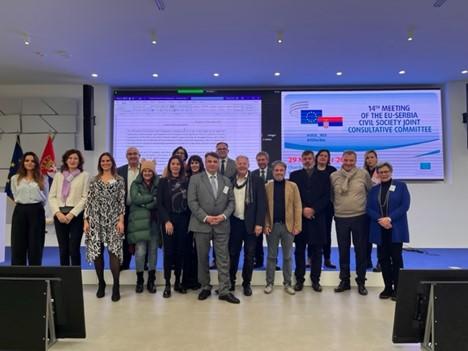European Economic
and Social Committee
Civil Society in Serbia: "This is our last train to EU integration and we shouldn't miss it"
The EU-Serbia Joint Consultative Committee (JCC) held its 14th meeting on 29 November 2022 in Belgrade, to discuss the state of play in the accession process and reform policies in the country. The participants from Serbia and the EU Institutions, as well as from civil society organisations pointed out concerns and challenges that still need further improvement. The joint declaration of the EU-Serbia JCC was adopted unanimously.
Both co-chairs of the EU-Serbia Joint Consultative Committee, EESC member Laurenţiu Plosceanu and Boško Savković, Secretary General of Association of Employers, stressed that a vibrant and healthy civil society is a key pillar for any healthy democracy
and expressed their satisfaction with the fact that the participation of the EU and Serbian authorities illustrates that they acknowledge its importance.
Miroslav Gačević, from the Ministry of European Integration of the Republic of Serbia, emphasised the importance of harmonisation of Serbian law with the EU acquis, adding: The government will prioritise increased work in the field of the rule of law, reform of justice, fight against corruption and freedom of expression
.
Emanuele Giaufret, Head of the Delegation of the European Union to the Republic of Serbia, pointed out that the EU is committed to the accession process of the Western Balkans
, while reforms, particularly on the rule of law and the fundamentals cluster are key
.He reaffirmed that civil society in the region plays a crucial role, and that the European Union will continue to support it.
The Serbia Report 2022 demonstrated progress in certain areas, little or no progress in other fields, whereas no progress was made regarding freedom of expression. Michael Miller from the European Commission's Directorate for Neighbourhood and Enlargement Negotiations, who presented the findings and recommendations of the report, stressed that more efforts are also needed to ensure systematic cooperation between the government and civil society.
Nikola Burazer, Program director of the Centre for Contemporary Politics and executive editor of European Western Balkans, addressed the problem and the worrying issue of media freedom in Serbia, stressing that without media freedom, there can be no democracy
.
Civil society perspectives on current challenges for Serbia's path towards EU membership
Civil society representatives and social stakeholders called for a genuine involvement of civil society in reform policies and social dialogue. They also highlighted the application of environmental standards, a crucial issue in the country.
Serbian authorities should conduct reforms in open processes with the genuine and concrete involvement of civil society
Zlatko Minić from Transparency Serbia affirmed.
Bojana Selaković, Coordinator of the National Convention of the European Union in Serbia, underlined that civil society has to be consulted and authentically involved in all stages of the political reform. We have to change our approach, as focusing the accession process on form instead of substance brings new challenges for the civil society, distances it from citizens and further polarises the public on important societal subjects
. And added: This is our last train to EU integration, a real opportunity to get the systemic reforms completed. We shouldn't miss it
.
Jelica Minić, President of the European Movement in Serbia, insisted on the role of cooperation between civil society and Serbian government, focusing on the support of entrepreneurs in Serbia. As she said, We have to make serious efforts for equal treatment of domestic entrepreneurs and foreign investors", adding that "economic development is a precondition for democracy
.
Environmental issues, one of the biggest concerns in Serbia, were addressed by Natasa Djereg from the Centre for Ecology and Sustainable Development. Serbia is choking in environmental problems; we need urgent action to better regulate foreign investments and align with the EU environmental standards
. Clips from three different sites in Serbia were shown illustrating the alarming situation in the country, in regard to air pollution, mining and environmental issues with the participants concluding that urgent action and support is needed to mitigate damages, reverse the trend and put Serbia on a more sustainable path.
Expressing his concerns about the police reform, Igor Bandović from the Belgrade Centre for Security Policy said that a real operational autonomy of the Serbian police had to be ensured.
The 14the EU-Serbia JCC meeting concluded with the adoption of a joint declaration available on the event page.
Work organisation
Downloads
-
Civil Society in Serbia: "This is our last train to EU integration and we shouldn't miss it"
